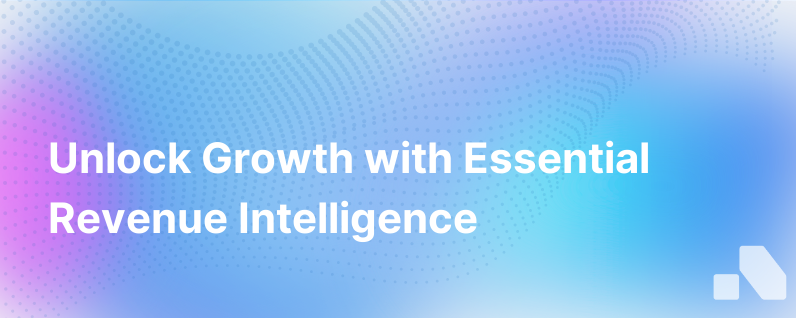
As companies navigate today's data-driven marketplace, revenue intelligence has emerged as a key differentiator in crafting highly effective sales strategies. This new discipline, a thorough blend of data analysis and sales insights, ensures that businesses can not only meet their financial targets but also optimize every stage of the customer journey.
In this guide, we explore the dimension of revenue intelligence, its importance for organizations, and why your business, regardless of size, should be tapping into its potential to maximize revenue streams.
Understanding Revenue Intelligence
At its core, revenue intelligence combines real-time data analysis with artificial intelligence (AI) and machine learning (ML) to provide deeper insights into customer interactions, sales efficiency, and overall performance. It's about shifting from gut feelings and manual data entry to a data-driven world where predictive analytics lead the way.
To provide a clearer understanding, let's dissolve the term into actionable components:
- Data Integration: Centralizing data from various touchpoints and departments leads to a more unified view of the sales ecosystem.
- Predictive Analysis: Using AI to analyze patterns, predicting outcomes such as which leads are most likely to convert or which clients may churn.
- Prescriptive Actions: Not just stopping at what might happen, but also suggesting how to potentially influence outcomes.
- Real-Time Insights: Delivering timely insights that enable immediate and strategic action.
The Importance of Revenue Intelligence
Organizations, from burgeoning startups to sprawling enterprises, continually seek out tools and methodologies that can bolster the bottom line. Revenue intelligence emerges as a powerful addition to that toolbox for several compelling reasons:
Aligns Sales and Strategy
One of the pivotal benefits of revenue intelligence is its ability to take the pulse of sales operations in a heartbeat. This check on the heartbeat is not a once-a-quarter physical but a constant monitoring system that ensures a company's strategy is always aligned with the ground reality.
Improves Sales Efficiency
By aggregating and analyzing customer interaction data, revenue intelligence platforms can identify best practices across your top performers. These insights can then be scaled across the entire sales team to streamline processes and adopt strategies that work.
Enhances Customer Experience
Today's customer journeys are incredibly complex. Revenue intelligence helps businesses untangle this complexity by tracking each interaction and identifying the pivotal moments that lead to a closed deal or a decision to churn. By doing so, companies can better meet customer expectations and tailor their approaches to individual needs.
Drives Incremental Growth
In business, leaving money on the table is a cardinal sin. Revenue intelligence helps identify upsell and cross-sell opportunities by understanding customer behavior and identifying patterns in product or service usage.
Diminishes Reliance on Human-Centered Reporting
Traditional sales rely on self-reporting methods, which are not only time-consuming but often inaccurate. Revenue intelligence automates data capture, reducing human error and freeing up your sales team to focus on what they do best — selling.
Why Your Business Needs Revenue Intelligence
Now that we've established what revenue intelligence is and why it's important, let’s discuss why it's not just a nice-to-have but a necessity for businesses serious about scaling their operations and revenue.
Competitive Edge
In the digital age, everyone has access to data. But it's not about who possesses the data; it's about who can leverage it most effectively. Revenue intelligence provides the competitive advantage you need to stay ahead in a crowded market by swiftly identifying trends and course-correcting in real time.
Forecasting Precision
Financial forecasting has traditionally been akin to looking into a crystal ball. Revenue intelligence transforms forecasting from an educated guess into a science. By gleaning insights from historical and real-time data, businesses can predict future performance with a much higher degree of accuracy.
Time and Resource Optimization
Modern sales operations are all about efficiency. Revenue intelligence platforms automate mundane tasks, such as data entry and report generation, allowing sales teams to focus their time and effort on crafting personalized customer engagements.
Objective Performance Assessment
For management, understanding why a sales team is succeeding or falling short can sometimes feel like piecing together a puzzle. With revenue intelligence, metrics and analyses provide an objective perspective on performance, taking the guesswork out of management decisions.
The Aomni Advantage
In the intelligent era, Aomni stands as an ally for businesses aiming to supercharge their sales function. Aomni’s AI-driven platform doesn't just offer insights; it delivers a comprehensive suite of tools for B2B sales:
- Real-time account research for informed engagement with prospects.
- Actionable competitive insights to dictate the market, rather than respond to it.
- Personalized sales content that speaks directly to prospect needs, driving conversions.
The result is not just improved sales figures but a thoroughly optimized, intelligent sales pipeline that is driven by facts and primed for scale.
Conclusion
Revenue intelligence is more than a buzzword; it's a strategic imperative for businesses in today's fast-paced and data-saturated market environments. With its capacity to transform raw data into actionable insights, revenue intelligence guides companies towards more strategic decision-making and resource allocation, ensuring that each move is made with a clear understanding of its impact on revenue.
Adopting a revenue intelligence platform like Aomni can elevate your business performance, delivering the analytical thinking and automation needed to thrive amidst competition and the ever-evolving demands of customers.